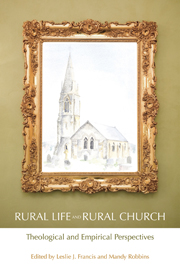Book contents
- Frontmatter
- Contents
- Preface
- Foreword by The Bishop of Shrewsbury, The Rt Revd Mark Rylands
- 1 Introduction: shaping rural theology
- PART 1 PERSPECTIVES FROM THE BIBLE
- PART 2 PERSPECTIVES FROM ORDINARY THEOLOGY
- PART 3 THEOLOGICAL AND SOCIOLOGICAL PERSPECTIVES
- PART 4 HISTORICAL PERSPECTIVES
- 11 Blackshawhead: a local case history in rural church categorization
- 12 Is the rural church different? The special case of confirmation
- 13 Rural Anglicanism: one face or many?
- 14 Pastoral fragments: discovered remnants of a rural past
- PART 5 LISTENING TO VISITORS
- PART 6 LISTENING TO THE COMMUNITY
- PART 7 LISTENING TO CHURCHGOERS
- PART 8 LISTENING TO CHURCH LEADERS
- PART 9 SATISFACTION AND STRESS IN MINISTRY
- Contributors
- Sources
- Subject Index
- Name Index
13 - Rural Anglicanism: one face or many?
from PART 4 - HISTORICAL PERSPECTIVES
- Frontmatter
- Contents
- Preface
- Foreword by The Bishop of Shrewsbury, The Rt Revd Mark Rylands
- 1 Introduction: shaping rural theology
- PART 1 PERSPECTIVES FROM THE BIBLE
- PART 2 PERSPECTIVES FROM ORDINARY THEOLOGY
- PART 3 THEOLOGICAL AND SOCIOLOGICAL PERSPECTIVES
- PART 4 HISTORICAL PERSPECTIVES
- 11 Blackshawhead: a local case history in rural church categorization
- 12 Is the rural church different? The special case of confirmation
- 13 Rural Anglicanism: one face or many?
- 14 Pastoral fragments: discovered remnants of a rural past
- PART 5 LISTENING TO VISITORS
- PART 6 LISTENING TO THE COMMUNITY
- PART 7 LISTENING TO CHURCHGOERS
- PART 8 LISTENING TO CHURCH LEADERS
- PART 9 SATISFACTION AND STRESS IN MINISTRY
- Contributors
- Sources
- Subject Index
- Name Index
Summary
Abstract – Over the last twenty years the use of statistical analysis to inform church studies has developed apace. Increasing numbers of empirical studies are concerned with the ‘rural church’. A key problem with regard to these studies is the definition of ‘rural church’. A variety of approaches has been taken in respect of studying ‘Rural Anglicanism’: the single diocese approach, the five-diocese approach, and the ‘average diocese’ approach. This article takes data for seven rural dioceses and examines changes between the late 1950s and early 1960s and the year 2000, in relation to indicators of church vitality. These indicators relate to churches, clergy, laity, membership, and seasonal practice. Differences between the dioceses are noted, and questions for further research are raised. The data suggest that ‘Rural Anglicanism’, as reflected in rural dioceses, is complex. As autonomous administrative units, the dioceses may have considerable say in their destinies through diocesan policies. It is argued that to think in terms of the many faces of ‘Rural Anglicanism’ rather than one ‘Rural Anglicanism’ may be more appropriate.
Introduction
Good statistics properly used should be able to provide a sharp tool for analysing the strengths and weaknesses of an organization and for predicting future trends. Exponents of the branch of practical theology known as empirical theology have argued that the tools of statistical analysis are properly able to draw attention to matters of concern in areas such as ministry and mission, and exercise a proper prophetic function.
(van der Ven, 1993, 1998)In his book Rural Anglicanism, Francis (1985) set out to employ the tools of statistical analysis to draw a picture of strength and weakness in rural Anglicanism.
- Type
- Chapter
- Information
- Rural Life and Rural ChurchTheological and Empirical Perspectives, pp. 145 - 160Publisher: Acumen PublishingPrint publication year: 2012

